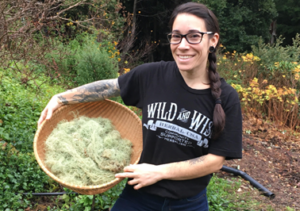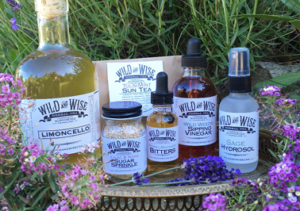
Pathways to Healing
How herbal medicines – and the foods we eat – empower us to heal ourselves & our communities.
by Holly Hilgenberg, Cooperation Humboldt
Our current healthcare system with its dependence on for-profit health insurance has left millions of us with inadequate coverage, or no coverage at all. This expensive and unequal system has contributed to bankruptcy, homelessness, preventable disease and death.
As many among us work to create a better alternative – one that provides high-quality, cost-effective health care for all – a hunger for solutions that can be enacted at the personal and community level has also grown.
More and more of us have become aware of the relationship between what we eat and our overall health, and a growing awareness of herbal medicine has taken root. Locally, we are fortunate to have many individuals, organizations, and businesses working to provide us with locally grown health-enhancing foods and herbal medicines.

Isis Walls and Jacob Ferdman, Five Finger Farms / photo credit: Five Finger Farms
From Farm to Tincture: Five Finger Farms
For Isis Walls and Jacob Ferdman of Five Finger Farms, growing medicinal plants is about remembering our relationship with nature, and sharing it with others. They started their farm as “a way to connect with the seasons and rhythms of nature, and share those connections with our community.” Despite the increase in popularity of herbal medicine, Isis and Jacob noticed that many of the herbs in their favorite products were imported. This spurred their goal to provide individuals and herbal product makers with affordable, locally grown medicinal herbs.
Five Finger Farms began as a quarter-acre space in 2018, growing quickly to their current location, where they farm on nine acres in the Eel River delta. The duo was able to rent the land and buy the necessary supplies thanks to funds raised through Kickstarter, and they acknowledge how important community support has been from the beginning. “We are so thankful for those who gave us the space to farm,” they said, noting that, “the hardest part of farming is getting started, and it seems almost impossible to do so without the support of friends, family and the broader community.”
The farm grows crops such as calendula, chamomile, ashwagandha, lemon balm, marshmallow root, yarrow, Tulsi basil and milky oats, which they offer dried, fresh, tinctured, infused in oil or distilled. They are currently working on expanding these offerings by developing non-alcoholic extracts such as oxymel (made with vinegar and honey), with the aim of making herbal medicine more accessible and palatable for everyone.
Isis and Jacob are excited to see more folks studying healing traditions including Traditional Chinese Medicine, Ayurveda and many Indigenous practices. They hope this recognition of herbal medicine’s diverse history will be a step toward building a better world. “We believe that the thoughtful sharing of knowledge and wisdom of our collective relationship with plants can bring people together to heal ourselves and the planet.”

Nicole Gagliano, Wild & Wise Herbal CSA / photo credit: Wild & Wise
Community Supported Year Round: Wild & Wise
Nicole Gagliano of Wild and Wise Herbal CSA also sees herbal medicine as a key component to healing and moving toward a brighter future. Nicole began working in herbal medicine 12 years ago when she began meeting with a small group to brainstorm ways to bring herbal healing to the community. While there were many ideas the group explored, it was creating an herbal CSA (Community Supported Agriculture) that stuck with Nicole.
Today, the heart of Wild and Wise is its herbal CSA, which has been in operation for 10 years, and is the only herbal CSA in Humboldt County. Similar to a vegetable CSA, members sign up at the start of the year and receive a package each season full of goodies including tinctures, teas, and products for body and skin care. Nicole says the seasonality of the CSA is one way of connecting people to the plants growing seasonally in our bioregion.
In addition to providing the products themselves, Wild and Wise also helps educate CSA members on how various plants can aid in their health. As Nicole says, “Herbal medicine is empowering! Having the knowledge to maintain and restore good health to yourself and those around you is radical and life changing.” In each package, CSA members also get an educational newsletter that includes information about the herbs in each product and a guest article by a fellow herbalist.
While supporting local herbalists is one great way to bring herbal healing into your life, Nicole encourages people to try their hand at growing medicines themselves if they are able. “Growing herbs offers a connection to your land, to your medicine and to your community,” she says.

Casandra Kelly, Casandra Kelly Catering / photo credit: Casandra Kelly Catering
Food as Medicine: Casandra Kelly Catering
Healing is not limited to tinctures, salves and teas; humans have been experiencing healing through food for millennia. Many common plants in your backyard that help with various ailments can also be added to your diet for extra boosts of nutrients, vitamins and minerals (see page 48). It’s not a coincidence that many of the herbs you may find in your pantry (such as oregano, mint, thyme and rosemary) are useful for both flavor and for their healing properties.
Casandra Kelly (they/them) is a local chef who sees food as having potential to be both nutritious and healing. “I do think food is medicine,” they say, “It’s a conduit for how we ingest so many things and our first line of defense is having a healthy relationship with food. If we aren’t doing that, we aren’t getting the nutrients that we need. And if we aren’t getting the nutrients that we need, then none of the medicine we are taking in is going to be helpful.”
Casandra Kelly Catering provides meal services for all occasions – from large gatherings to private dinners and individual meals. For Casandra, the meals they prepare aren’t just about feeding their clients. “My basis for understanding meals and what I provide for people is more of an integrated health system,” they say. Though Casandra makes it clear that they are not an herbalist, their knowledge of herbal medicine and Ayurveda shape their meal offerings, along with their understanding of food’s healing potential. For Casandra, the food they make is about bringing health and joy into their clients’ lives, and helping them to heal from formative relationships that Casandra notes most people have in one way or another with food.
Like Isis, Jacob and Nicole, Casandra points to the importance of community support in enabling them to run their own business. Like many in the service industry, Casandra found themself without a job when COVID hit, and ultimately decided to take the leap and put their stimulus money toward making the business their full-time job. This came after working for over a decade in kitchens and catering large gatherings. Casandra points to the strong, supportive women who mentored them along their way, as well as this region’s farming community as being foundational to their journey.
Casandra’s experiences learning from local farmers brought them a whole new understanding of food. “Farming has given me a deep lesson into seasonality and microclimates,” they say, “Much like a farmer, I can tell when a green bean is just past its prime without even biting into it. That’s just not something you can learn in a kitchen.” Beyond the knowledge Casandra has gained from the farming community, “their practice and dedication stays with me every time I cook.”
This unprecedented time didn’t just prompt Casandra to focus on their catering business; it also inspired clarity about what kind of business they wanted to create. Following the murder of George Floyd in 2020, they could no longer be apolitical as a business owner. As someone who identifies as queer, Jewish and a person of color, Casandra had had their share of experiences not feeling safe in previous workplaces.
When Casandra made the decision to make a statement through their business about the social unrest taking place, they lost about half of their followers, which they note is “a lot for a small business.” But Casandra persisted, believing that it is more important for them to run a business where their employees and clients feel safe and supported, particularly because the majority of the people they work with are queer and people of color.
“I want people who work with me to feel like they are accepted and I will back them up and stand behind them. I don’t want anyone to come into my business and feel like they are othered or that they have to live in fear. My number one priority for my staff is health and safety,” they say. According to Casandra, the past year has brought a lot of previously unaddressed inequality to the surface, including in the industry they work in. They point to how service industry folks are among those being hit the hardest by the pandemic, as many have lost their livelihoods, don’t have health insurance and have underlying health issues resulting from the high stress environments they’ve worked in.
While the pandemic has brought the inequalities and inadequacies of our healthcare system (and society in general) into the spotlight, it’s an even greater reminder of how important empowerment and accessibility in healing are. Plant medicine can be one path that can get us there, especially if we take care to support each other on the way.
. . . . . . . . . . . . . . . . . . . . . . . . . . . . . . . . . . .
Holly Hilgenberg (she/her) is a writer, artist, and lover of nature, plants, vintage clothing, print publications and thrifting. Being part of Cooperation Humboldt has been her favorite way to combine social change work, creativity and community building since she moved to Humboldt from Minneapolis 2.5 years ago.
. . . . . . . . . . . . . . . . . . . . . . . . . . . . . . . . . . .

Photo credit: Wild & Wise
Plant medicine is for everybody!
While there are many intricacies involved with making plant medicines, it can also be very simple! Take it one step at a time. Developing a relationship with just one plant can be life-changing, and you don’t need to be an expert to work with plant medicine.
Here are a few basic ways herbs can be used*:
- Tinctures: Dried or fresh herbs added to alcohol (or vegetable glycerine for a non-alcoholic option) to extract the plant’s healing properties.
- Oils: Similar to tinctures, using oil and typically dried plants.
Balms and Salves: Uses an infused-oil base, with beeswax added to make the medicine more like a paste (for external use). - Teas: Dried or fresh plants steeped in boiling water for a healing drink.
- Oxymel: Similar to a tincture, but with vinegar and honey instead of alcohol or vegetable glycerine.
- In your food: Try plants fresh in salads or add them to soups or pastas. Add dried herbs to everything you cook!
*Note: Typically, the plant material is removed from all of these options (with the exception of adding them to your food) before using.